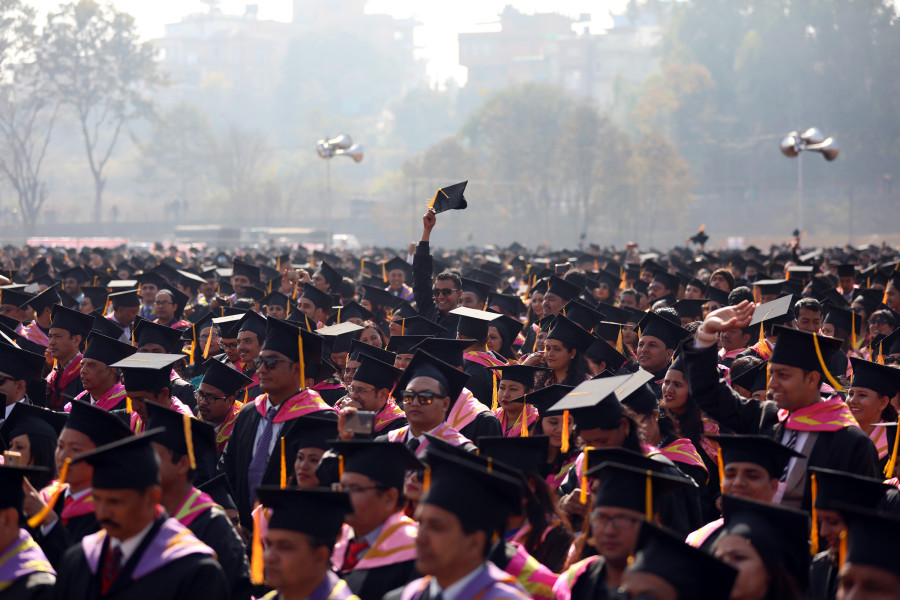National
UGC to oversee equivalency, credit transfer, and quality accreditation in higher education
Tribhuvan University loses authority as amended law grants the University Grants Commission legal mandate to handle equivalency.
Sudip Kaini
The University Grants Commission (UGC) will now issue equivalency certificates for foreign university degrees, a task previously handled by the Tribhuvan University.
Following amendments to the University Grants Commission Act, 1993, through amendments to Some Nepal Laws, the UGC has also been legally authorised to manage higher education credit transfers and quality assurance and accreditation (QAA).
The revised law, authenticated by President Ramchandra Paudel and published in the Nepal Gazette, adds a clause to the Commission’s duties–determining the equivalency of degrees granted by foreign universities or equivalent institutions.
UGC Chairperson Devraj Adhikari said the commission will start issuing equivalency certificates from July 17, 2026. Those who received certificates from Tribhuvan University before that date will not be required to reapply.
TU’s Curriculum Development Centre previously handled the equivalency process under the Rector’s Office. The shift comes in response to long-standing concerns over inconsistency and lack of transparency in TU's decisions.
“Parliament amended the law based on the Commission’s proposal. We will begin determining equivalency and related matters by establishing guidelines with clear standards,” said Adhikari. “Currently, even students who complete their studies at other universities in Nepal must obtain equivalency from Tribhuvan University for official works.”
The amended law also requires the UGC to publish updated lists of recognised degrees and institutions every six months.
In its 2018 report, the High-Level Education Commission recommended transferring this responsibility from TU to the UGC.
The amendments further grant UGC the clear authority to implement credit transfer and QAA measures. While the Commission previously handled such tasks, it lacked legal backing until now.
UGC is drafting a national standard with a committee led by Professor Govinda Nepal to facilitate credit transfers across universities. “A national standard for inter-university credit transfer is being developed. Until now, there has been no clear practice of this in Nepal. Now it has gained legal recognition,” said Chairperson Adhikari. He said a credit bank will also facilitate credit transfers.
“If a student is unable to complete their studies on time, the credit bank will keep track of their attendance and allow them to finish their education within a specified period,” he said. “Although some universities have facilitated credit transfers, there has been a lack of uniformity and national standards in the process.”
The discussion around credit transfer gained traction after the death of a Nepali student, Prakriti Lamsal, at KIIT University in Odisha, India, earlier this year. After the incident, several universities in Nepal encouraged returning students to apply for admission through credit transfers but faced regulatory hurdles.
Regarding QAA, the amended law mandates UGC to ensure higher education institutions meet specific academic and infrastructure standards. So far, only 137 of Nepal’s approximately 1,400 campuses have received QAA certification.
Standards for QAA include faculty-student ratios, lab and library facilities, land ownership, and building infrastructure. The UGC assesses institutions based on these indicators to decide whether to grant accreditation.
Under TU’s current policy, only QAA-certified campuses can add new subjects or programmes. TU has around 1,000 affiliated campuses.
In December last year, the Ministry of Education directed foreign-affiliated colleges in Nepal to obtain mandatory QAA certification from the UGC. However, a study committee found that this requirement was ineffective.
Of the 59 foreign-affiliated colleges in Nepal, only 10 have received QAA certification. As current directives require, these are affiliated with universities ranked within the top 1,000 globally.
The same guidelines specify that only programmes from the top 1,000 global universities with mandatory QAA should be allowed in Nepal. The study committee concluded that weak regulation and oversight by the Education Ministry have allowed many foreign colleges to operate outside established standards.




 20.12°C Kathmandu
20.12°C Kathmandu














